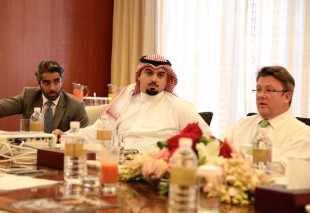

SIAL Food Innovation: Riyadh

Food innovation in Riyadh is being stifled because the traditional Saudi consumer lacks the knowledge and experience to fully appreciate a premium restaurant experience, according to the roundtable debate in Riyadh, Saudi Arabia.
The panellists dreamed of a day when Saudis knew as much about food as they do about cars.
“Everything’s overcooked here,” they agreed. “For example,” added Mark Wood, director of operations at Food International, “with wagyu beef, we’ve explained to customers that it should be served medium rare. Then the customers says: ‘Great, but can I have it well done?’”
“The Saudi consumer needs more knowledge. They know cars, but [international] food is very new,” said Mohammed Jawa, managing partner of Nozomi. “When the first international restaurants came here — normal restaurants — it was like they came from outer space. There was a buzz, and shock and a slow adaptation to new ways of cooking and eating.”
“The market has been very basic for the last 20 years in Saudi. It has started to modernise, and we are beginning to see some acceptance by the consumer of new ideas,” added Jawa.
“The previous generation had a fear of change, and a culture of cooking at home — very traditional food. But the new generation don’t want cultural food — they want international flavours, new ideas.
“The Saudi consumer is now one of the top travellers in the world. And that will helping the food market develop.”
Wood said of Saudi customers: “We need early adopters who aren’t price sensitive. The local market will pay top dollar for quality cars, but not for quality food.”
Matthew Cropp, corporate director of F&B culinary and concept development at Al Khozama Management Company, agreed. “Our market is just starting, it’s new. Customer loyalty and reputation will come from quality service and positive experience,” he said.
“We are in the education business. We have to educate people on the new concepts we are bringing in. Explain good food, and people start to get you and believe you.”
But Nozomi Riyadh general manager Farshid Ahvan warned that restaurants tread a fine line between education and adaptation. “If you try to innovate and educate too much, you’ll empty the restaurant. If you adapt too much, you’ll be the same as everyone else.
“It’s a tough job we do in this market because we’re pioneers. When you bring something new and high quality, it is difficult. Because now there is no collective effort. It’s a huge fight — all individuals are fighting the system. It’s not being thought through. And the government hasn’t yet realised there’s money in hospitality.”
Wood contended: “People here adopt a wait-and-see attitude. They sit back and, if something works, they follow. So you’ve got to go on your own. Competition should breed innovation. The mid-market moves to high-end, and the high-end has to do something special.”
“Create the benchmark and the competition has two options — to raise their standards or shut down,” agreed Jawa.“When the market here is built, then innovation will become easier, like in London where if you’re not new, innovative, creative, or high quality, you’re out of the market.”
Chef and TV presenter Gary McKenna suggested that female customers might hold the key to innovation. He explained: “Women are the market leaders in food in Saudi because they are better educated than men. My menu is very feminine, because I know men follow women. But most restaurant owners think like men, and that’s not the way forward.
“Female-friendly restaurants create a buzz. It’s all about the execution and seeing it through with the finer details.”
A WORD FROM OUR SPONSOR...
Rizwan Mustafa, group marketing director — Middle East & ASEAN, SIAL Middle East says: “Innovation is the DNA of SIAL events worldwide and the Middle East is no exception. This is why SIAL Middle East partnered with Caterer Middle East to discuss food innovation in the region with a series of roundtables in Doha, Riyadh and Jeddah.
“Participants in each city offered their unique perspectives on innovation, including the challenges that hamper it. One of the common themes emerging from these discussions was the problem of sourcing the right ingredients to achieve authenticity. The limited availability of suppliers willing to import specific ingredients is a major hindrance and multiple channels of import are hence necessary to ensure that horeca and foodservice have a consistent supply of required ingredients.
“SIAL Middle East promotes innovation in the food, beverage and hospitality industry. It provides an ideal platform for culinary professionals to act as influencers and push distributors and suppliers within their respective regions to import their required products.
“In order to showcase the most innovative products in the region, SIAL Middle East features a dedicated zone within the event called SIAL Innovation, and an associated awards programme. Last year, out of the original 142 food and beverage products entered, 42 were shortlisted, out of which 10 finalists were selected. Eventually Camelait Premium Camel Ice Cream by Al Ain Dairy was named the Gold Award Winner.
“Winners from all SIAL events in the past year will be present in person at SIAL Middle East, so visitors will be able to taste and try food products that have won the prestigious Gold Award in Paris, China, Canada, Manila and Jakarta.”
SIAL Middle East 2015 takes place on December 7-9, at the Abu Dhabi National Exhibition Centre. For more information, visit sialme.com.